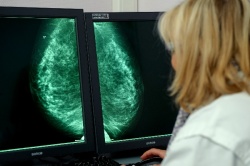Trivialising breast cancer kills women
‘As we become more successful in the early detection and treatment of breast cancer, we tend to trivialise it. Yet one in 9 women still get breast cancer. Half of them become depressed, their partners don’t know how to react and their families are in disarray. We need to stop trivialising breast cancer. It kills women.’ So says Dr Fabienne Liebens, Head of the Saint-Pierre Hospital’s Breast Clinic and among the world’s leading experts on breast cancer and mammography.


Gynaecologist and oncologist Dr Fabienne Liebens coordinates the Multidisciplinary Breast Clinic and Breast Screening Clinic ISALA, part of CHU Saint-Pierre hospital in Brussels. Passionately involved in saving women’s lives, she assumes her societal responsibilities as vice-president of the Belgian section of Europa Donna, the independent European Breast Cancer Coalition, currently including 42 member countries.
With some 170 cases per year, the ISALA is one of Belgium’s largest breast centres and a key referral clinic. 6,000 women are examined annually and some 13,000 breast examinations performed. Dr. Liebens: ‘Our staff numbers 40, of which 80% are women including eight radiologists and seven breast clinicians. We also consult with gynaecologists, surgeons and GPs, and work with an oncology service in our building.’
Empathetic surroundings
The facilities are a striking antithesis of conventional hospital design. ‘We didn’t want women to feel they were coming to a hospital,’ Dr Liebens explained. ‘The reception area and waiting room are more like a lounge, which allows you to wait for your consultation in a relaxed way. The interior was designed by a female decorator who knows the clinic as a patient. People see no trace of mammography equipment or technology at the stand-alone clinic. All imaging, interventions and surgical procedures take place back at CHU Saint-Pierre.’
Occupying two active sites, the clinic needs strong quality control. With a keen focus on quality care, Dr Liebens pointed out that the breast nurse is a key to the concept, for she is a patient’s personal guide throughout a treatment. For the patient, she facilitates immediate liaison between medical and clinical staff and is present during all medical consultations. ‘We have one breast nurse, supported by four assistants who interact with other clinical disciplines,’ Dr Liebens explained. ‘The governmental plan stipulates one breast nurse for every 150 cases.’
Holistic guidance
‘From a study of 1,000 patients leaving the surgical oncology department, 92% are satisfied with our care. Key to this satisfaction is that psychological support is not an option but rather a fully integrated component of all treatment,’ she stressed. ‘Few, if any patients refuse this -- and we found that even six months after the surgical procedure, 65% considered the psychological support and counselling very useful. This proves the importance of our holistic view of the patient.
‘The clinic’s technology support of digital mammography systems, image enhancement software and associated products is ‘well hidden’, but it is of course key to our success,’ Dr Liebens added. ‘We need fast, productive solutions and immediate support in case of problems.
‘Agfa HealthCare is committed to the fight against breast cancer. They provide reliable technology but also partner us in patient-focused programmes through support of a wide range of endeavours to increase breast health awareness among women and medical professionals. Agfa was a key supporter of our release of Marie Mandy’s book ‘Through the eyes of an Amazon’. This remarkable publication conveyed in words and art the real-life experiences of Marie, a breast cancer survivor, that will give heart to women who must face this disease, its social and emotional ramifications, and treatment up to and including partial or radical mastectomy.’
Encouraging support for prevention research
Dr Liebens is highly concerned about the lack of focus on primary prevention efforts involving breast cancer. The disease incidence in developed countries is increasing, yet there is little institutional and industry focus on primary prevention. ‘The knowledge women have on breast cancer prevention is astonishingly low. Surprisingly, the first Belgian research on this issue was done only last year. It showed 85% of women questioned have no knowledge whatsoever of risk factors for breast cancer.’
Video displays in the clinic’s lounge provide prevention information and displays in a separate area convey results from prevention studies.
Closing in on DR image quality
Radiologist Dr Martine Van Beveren leads the team of seven mammography radiologists who diagnose images using two CR systems. They examine 45 women daily for clinical purposes, proactive screening or medical follow-up, producing some 13,000 studies annually.
‘As a mammography radiologist, I’m particularly concerned about breast image quality and dose reduction. To make the patient as comfortable as possible I also prefer fast solutions, which significantly reduce waiting and examination times. Agfa HealthCare’s DX-M Digital Mammography system, in combination with CR HM5.0 needle-based mammo detectors, considerably improves the performance of existing CR solutions. Our tests show its quality closes in on full direct radiography (DR) image quality with considerable dose reduction.’
26.10.2011
- breast cancer (628)
- IT (891)
- mammography (258)
- medical technology (1555)
- obstetrics (146)
- prevention (701)
- women's health (339)





